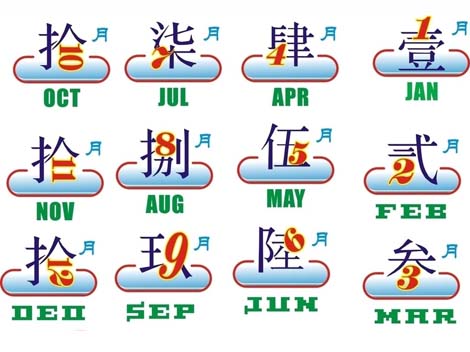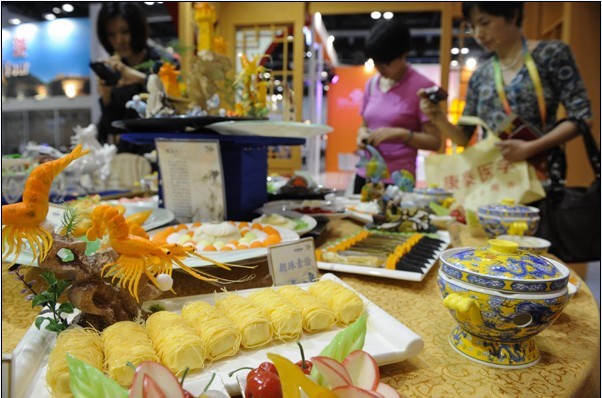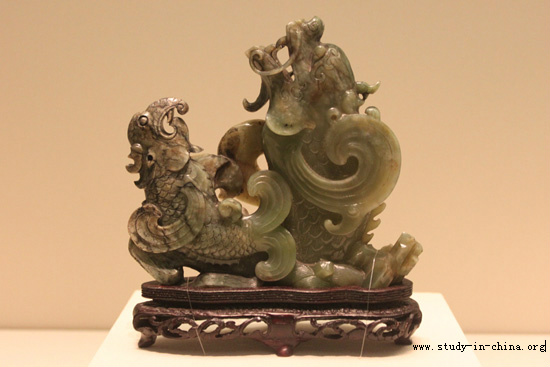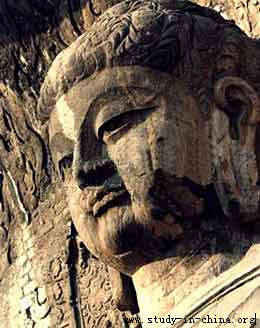| Home > China Feature |
Lucky and Unlucky Numbers in Chinese People's Eyes

In Chinese culture, certain numbers are believed by some to be auspicious (吉利) or inauspicious (不利) based on the Chinese word that the number name sounds similar to. However some Chinese people regard these beliefs to be superstitions.
Lucky numbers are based on Chinese words that sound similar to other Chinese words. The numbers 6, 8, and 9 are believed to have auspicious meanings because their names sound similar to words that have positive meanings.
Lucky numbers
Two
The number 2 (二) is most often considered a good number in Chinese culture. There is a Chinese saying: "good things come in pairs". It is common to use doublesymbols in product brandnames, such as double happiness, double coin and double elephants. In Cantonese, two is homophone of the character for "easy" (易). In Northern China, the number, when used as an adjective, can also mean "stupid".
Three
The number 3 (三) sounds similar to the character for "birth" (生,), and is considered a lucky number.
Five
The number 5 (五) is associated with the five elements (Water, Fire, Earth, Wood, and Metal) in Chinese philosophy, and in turn was historically associated with the Emperor of China. For example, the Tiananmen gate, being the main thoroughfare to the Forbidden City, has five arches. It is also referred to as the pronoun "I"[citation needed], as the pronunciations of "I" (我) and 5 are similar in Mandarin.
Six
The number 6 (六) in Mandarin is pronounced the same as "liu" (溜) and similar to "fluid" (流) and is therefore considered good for business. The number 6 also represents happiness. In Cantonese, this number is a homophone for blessings (祿 Lok). In I-Ching, the number 6 stands for "yin".
Seven
The number 7 (七) symbolizes "togetherness". It is a lucky number for relationships. It is also recognized as the luckiest number in the West, and is one of the rare numbers that is great in both Chinese and many Western cultures. It is a lucky number in Chinese culture, because it sounds alike to the Chinese character 起 meaning arise.
Eight
The word for "eight" (八 Pinyin: bā) sounds similar to the word which means "prosper" or "wealth" (發 – short for "發財", Pinyin: fā). In regional dialects the words for "eight" and "fortune" are also similar, e.g. Cantonese "baat3" and "faat3".
There is also a visual A total of 43 intermediate floor numbers are omitted from 39 Conduit Road: those missing include 14, 24, 34, 54, 64, all floors between 40 and 49; the floor number which follows 68 is 88.
Nine
The number 9 (九), was historically associated with the Emperor of China, and the number was frequently used in matters relating to the Emperor, before the establishment of the imperial examinations officials were organized in the nine-rank system, the nine bestowments were rewards the Emperor made for officials of extraordinary capacity and loyalty, while the nine familial exterminations was one of the harshest punishments the Emperor sentenced; the Emperor's robes often had nine dragons, and Chinese mythology held that the dragon has nine children. It also symbolizes harmony.
Moreover, the number 9 is a homophone of the word for "longlasting" (久), and as such is often used in weddings.
Some Chinese today believe that nine is lucky (or believed by others to be lucky) because it is the largest single-digit (Arabic) number. However, this does not derive from any Chinese tradition, as the largest single-digit Chinese number is ten (十).
Unlucky numbers
Four
Number 4 (四) is considered an unlucky number in Chinese because it is nearly homophonous to the word "death" (死). Due to that, many numbered product lines skip the "4": e.g. Nokia cell phones (there is no series beginning with a 4), Palm[citation needed] PDAs, Canon PowerShot G's series (after G3 goes G5), etc. In East Asia, some buildings do not have a 4th floor. (Compare with the Western practice of some buildings not having a 13th floor because 13 is considered unlucky.) In Hong Kong, some high-rise residential buildings omit all floor numbers with "4", e.g. 4, 14, 24, 34 and all 40–49 floors, in addition to not having a 13th floor. As a result, a building whose highest floor is number 50 may actually have only 35 physical floors.
Five
Although five (五) can represent "me" (吾) in Mandarin, it is usually associated with "not" (Mandarin 無, pinyin wú, and Cantonese 唔 m4). If used for the negative connotation it can become good by using it with a negative. 54 means "not die" or "no death". If used for the positive it can be used as a possessive. 528 is a way of saying "no easy fortune for me". 53 sounds like "m4 sang1 (唔生)" – "not live".
Six
Six in Cantonese which has a similar pronunciation to that of "lok6" (落, meaning "to drop, fall, or decline") may form unlucky combinations.
Seven
Seven is considered spiritist or ghostly. The seventh month of the Chinese calendar is also called the "Ghost Month". See Ghost Festival for more detail. During the month, the gates of hell are said to be open so ghosts and spirits are permitted to visit the living realm. However, the Chinese lunar calendar also has the 7th day of the month as Chinese Valentine's Day (七夕 qi xi), so the number 7 is not generally associated with bad luck. In most of the regions in China number 7 remains neutral or associated with luck.
Combinations
28, 38: As eight means prosperity, twenty eight equates to 'double prosperity', 38 being one of the luckiest, often referred to as 'triple prosperity'. Especially lucky on monetary items such as coins.
167, 169, 1679: In Hong Kong, seven (七) and nine (九) both have similar pronunciations to and, respectively, two of "the five most insulting words" in Cantonese – the male genital. Six in Cantonese also has a similar pronunciation to an impolite word which is used to count the number of cylindrical objects. Therefore, 167, 169, 1679 and other creative combinations (such as the infamous taboo "on-9-9") are dirty jokes in Hong Kong culture.
250: In Mandarin, 250 can mean "imbecile" if read in a certain way. 二百五 (èr bǎi wǔ), while literally being a correct way of reading 250 in informal speaking, is usually used to insult someone the speaker considers extremely foolish. Alternative ways such as 兩百五 (lǐang bǎi wǔ) and 二百五十 (èr bǎi wǔ shí) do not have this meaning. There are several different versions of the origin of the use of 250 as an insult, and it is unclear which one is correct.
5354: "唔生唔死" (m4 saang1 m4 sei2 in Cantonese) sounds like "not alive, not dead". This often refers to something that is half dead or on the verge of death.
1314: This sounds like "one life, one death" in both Mandarin and Cantonese, and is often used romantically, akin to "for better, for worse, for richer, for poorer, in sickness and in health, until death do us part" in English.
768: "七六八" (jyutping: cat1 luk6 baat3) rhymes with the phrase "一路發" (jyutping: jat1 lou6 faat3) in Cantonese, which means "fortune all the way." Alternatively, 168 "一六八" is sometimes used for the same term in Mandarin.
7456: In Mandarin, 7456 (qī sì wǔ liù) sounds marginally like "氣死我了" (qì-sǐ wǒ -le, "to make me angry," "to piss me off"), and is sometimes used in internet slang.
9413: "九死一生" (gau2 sei2 yat1 saang1 in Cantonese) – nine die to one live, meaning 90% chance of being dead and only 10% chance of being alive, or survived from such situations (a narrow escape).
521/5211314: In mandarin it is pronounced wu er yi, it sounds similar to wo ai ni. Which means I love you. 1314: also sounds like forever in cantonese. yut sung yut sei. which means one life one death in literal terms. Therefore 5211314 means I love you forever.
748: "七四八" In mandarin this number is pronounced "qì sǐ ba". If these numbers are stated in certain tones, it has a meaning which roughly translates into: "Why don't you go die?" This combination is more commonly used as an insult to others, or rather, an indirect death threat.
Any number of repeated 5s: "五" (wǔ) sounds like an onomatopoeia for crying, and is sometimes used in internet slang.
Art
 more
moreChina Beijing International Diet ...
Recently, The hit CCTV documentary, A Bite of China, shown at 10:40 ...

Exhibition of Ancient Chinese Jad...
At least 8,000 years ago, Chinese ancestors discovered a beautiful...

Longmen Grottoes
The Longmen Grottoes, located near Luoyang, Henan Province, are a tr...

Custom
 more
moreWeb Dictionary
Martial Arts
Tai Chi Master Class Held in Moscow
MOSCOW, June 15, 2016 (Xinhua) -- Students learn from Shaolin ...
Celebriting 70 years' efforts in restoring Mogao...
Work is being carried out at the restoration site of cave No 98 a...
Hong Kong Children's Symphony performs in Seattle
Under the theme of Tribute to the Golden Age, a concert featuring a ...





 print
print  email
email  Favorite
Favorite  Transtlate
Transtlate 








